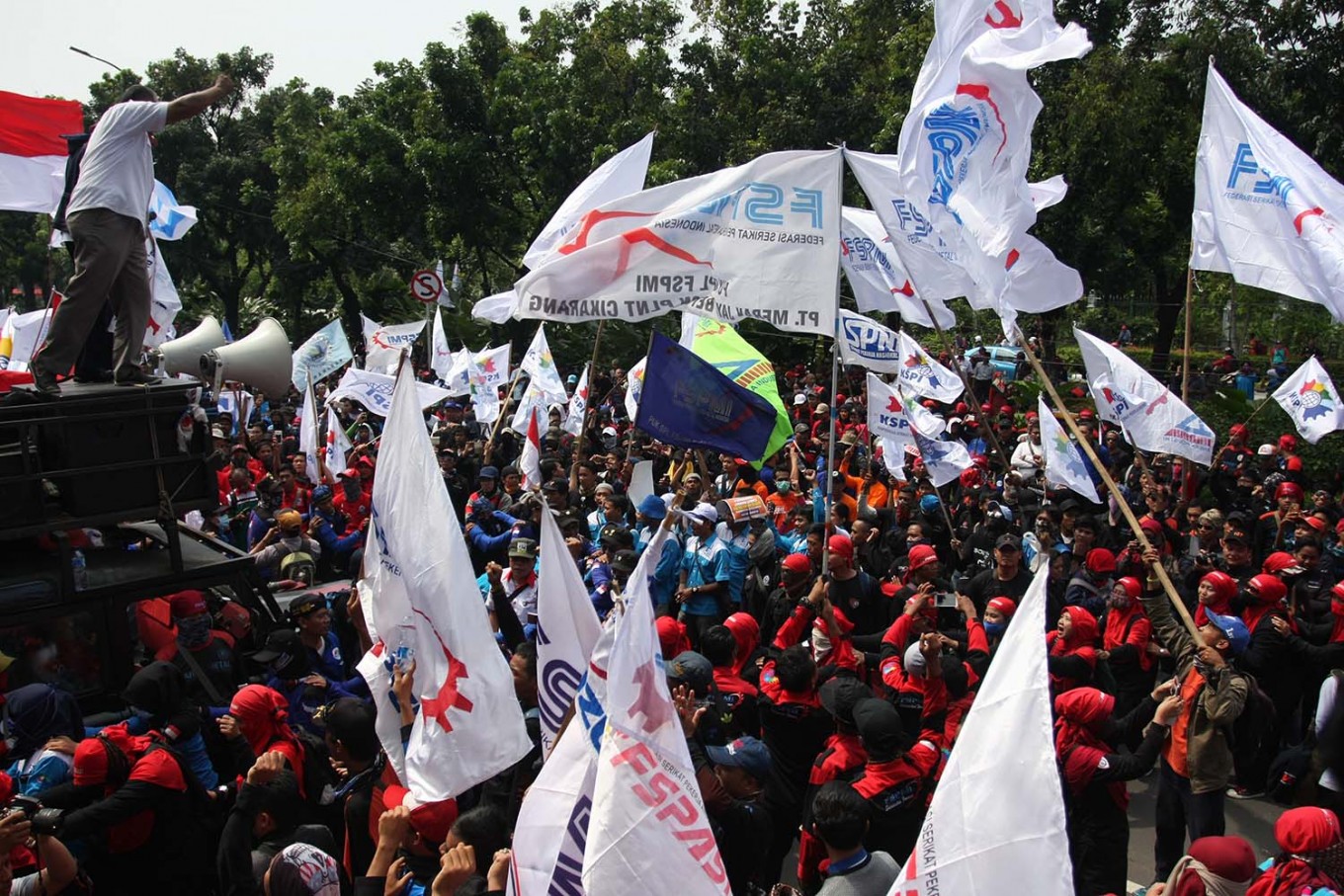Popular Reads
Top Results
Can't find what you're looking for?
View all search resultsPopular Reads
Top Results
Can't find what you're looking for?
View all search resultsWage subsidy urgently needed to protect jobs amid pandemic
The need for layoffs for struggling employers further poses the risk of losing experienced skilled workers which they would need after the pandemic ends. Is there an alternative for those employers? There is, but it requires further state intervention.
Change text size
Gift Premium Articles
to Anyone
I
t has been over a month since Indonesia’s government declared the COVID-19 pandemic a national non-natural disaster. Since then, many severely affected employers have been anticipating the possibility of laying off workers without having to pay severance pay according to the 2003 Manpower Law, citing circumstances of force majeure. However, the current labor law does not have such legal leeway.
The need for layoffs for struggling employers further poses the risk of losing experienced skilled workers which they would need after the pandemic ends. Is there an alternative for those employers? There is, but it requires further state intervention.
Read also: Indonesia’s unemployment numbers rise to 6.88 million in February
So far the government’s stimulus packages for the most needy have included the Family Hope Program, basic needs assistance, electricity bill discount, tax breaks, a special credit scheme for micro, small and medium enterprises, and the preemployment training program prioritized for those who have lost their jobs. As of April 20, the government figures show over 2 million have lost their jobs or been furloughed. How about workers still working in limping companies?
Perhaps this is the right time for Indonesia to consider a wage subsidy program designed to help employers keep employees and prevent further job losses while businesses consider their future viability and explore changes needed to adapt to the pandemic. Such a program could help Indonesian employers and their workers to resume operations once the pandemic subsides.
Take the export-oriented textiles industry that employs some 2 million workers, mostly women who are their family breadwinners. According to the Indonesia Textile Association (API), in the first six months of 2019, Indonesia exported textiles and clothing worth US$7.74 billion. In all of 2018, textile and clothing exports reached $13.22 billion. Thus, it is worth helping to maintain this labor intensive industry with government subsidies during the pandemic so that the manufacturers are ready for full-capacity operations after the crisis.
The International Labor Organization’s (ILO) webpage on COVID-19 published the report “COVID-19 and the world of work”, revealing how the ILO’s member states have developed various wage subsidy programs. The Netherlands has a program called Temporary Emergency Bridging Measure for Sustained Employment. Under this program, companies that meet a set of requirements get allowance from the Employee Insurance Agency (UWV), which supports their employees’ wages for three months, with a possible extension for another three months.
One requirement is that companies must keep their employees during the period covered by the allowance. The UWV, an autonomous administrative authority commissioned by the Social Affairs and Employment Ministry, will provide the company with an advance amounting to 80 percent of the requested allowance. The scheme covers employees both with permanent and temporary contracts.
Read also: Government to help pay interest on mortgages, car loans
Southeast Asian neighbors such as Vietnam, Malaysia and Cambodia have also allocated public funds to enable employers to retain their employees amid the pandemic. Vietnam has three months’ financial support for workers during unpaid leave or reduced working hours during the pandemic, allocated from the state budget.
Employers must contribute at least an equal amount of the government’s wage subsidies that would enable them to access loans at a zero percent interest rate for a maximum period of 12 months. The total wage received by workers during the period is at least 85 percent of the regional minimum wage.
In Malaysia, the government has provided a wage subsidy program since April 6 for companies with local workers who earn a certain level of wage and were registered since Jan. 1 for up to three months, depending on the size of the enterprise and the number of workers. Under this scheme, employers must retain their employees for at least six months, comprising three months upon receiving a wage subsidy and an additional three months after that.
In Cambodia, Prime Minister Hun Sen has announced a wage subsidy for garment factories whose operations or workers’ employment contracts are temporarily suspended, but employers must contribute part of the wage.
It is crucial for Indonesia’s government to issue a policy that enables employers to maintain their payroll so that by the time the pandemic passes, employers can immediately resume full-capacity operations. The wage subsidy program would also help the government avoid the burden of further unemployment benefits apart from the controversial training program.
The terms, size and duration of the subsidy programs can be discussed with the various industrial associations because the damaging impact of the COVID-19 pandemic is not the same for all industrial subsectors.
***
A member of the Indonesia Law Society, graduate of Utrecht University










